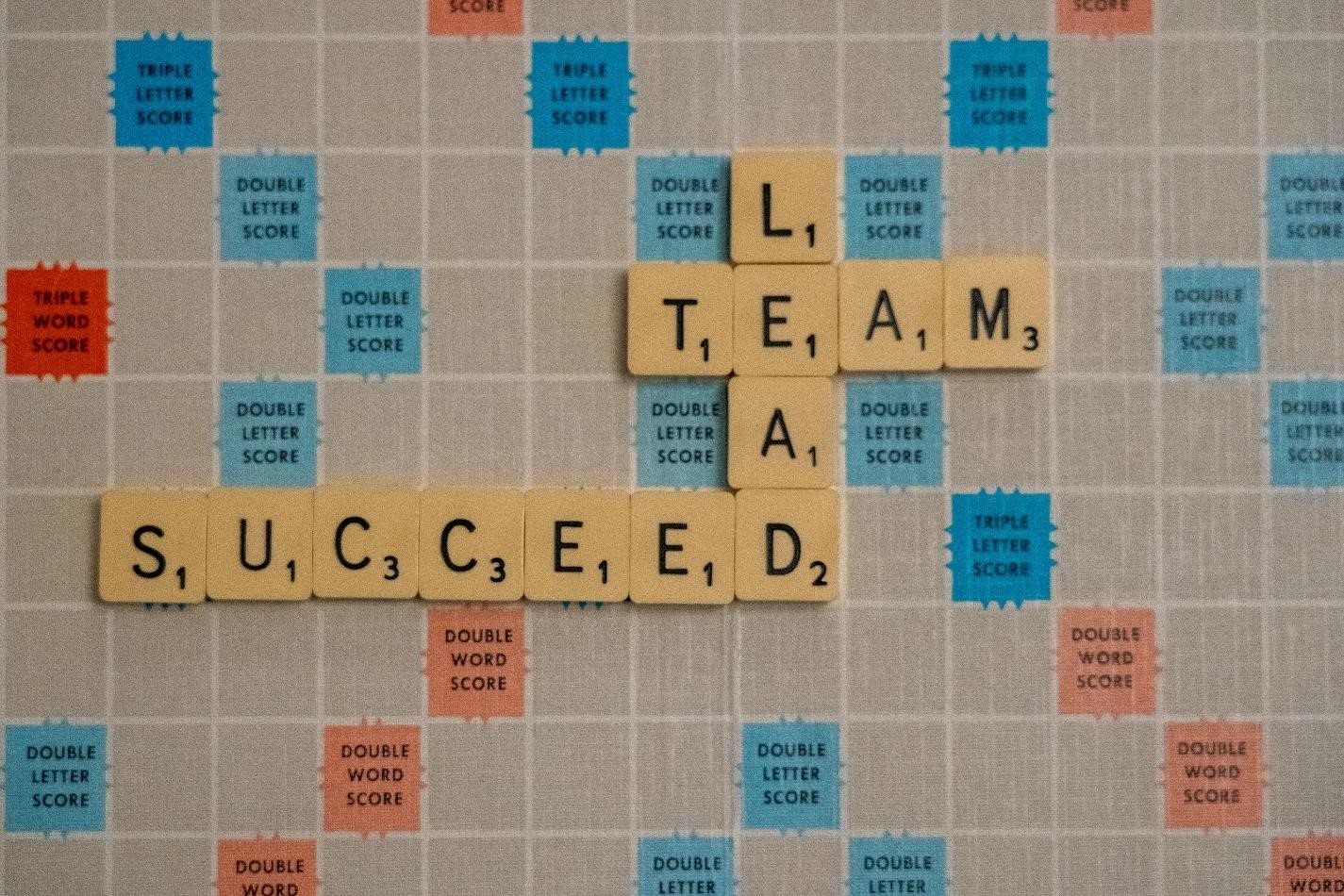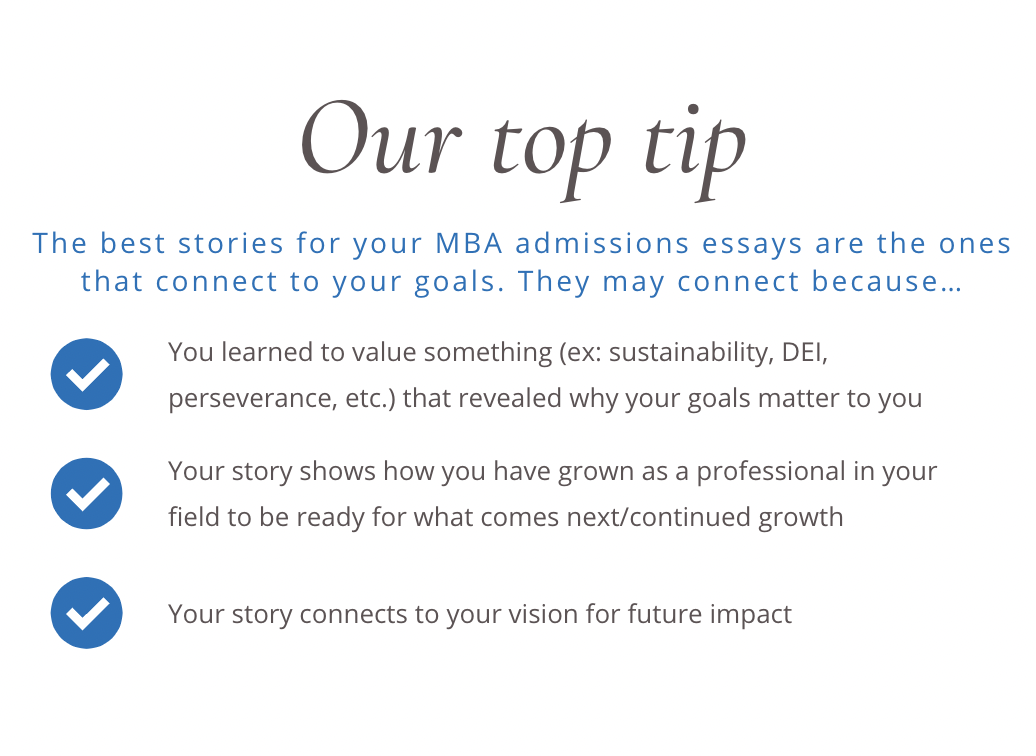You may have heard of the magic of storytelling. From helping you boost your presentation skills to nailing that interview, storytelling can enhance your messaging to connect with others, persuade your audience, and leave a lasting impression.
But guess what? Telling stories can also help you create stellar MBA admissions essays that land you a spot at elite MBA programs at institutions like Stanford’s Global School of Business, London Business School, or INSEAD.
In fact, at Ellin Lolis Consulting, we believe that storytelling is not just a useful tool – it is the key to formulating a persuasive argument. By encouraging our clients to focus their essays and interviews via storytelling, we have helped 98.7% of our clients gain admission to at least one of their target schools.
However, stories in your MBA essays must be chosen carefully. You do not want to explain your entire life journey or rehash your CV, since neither of those options will result in a message that compels your reader. Instead, you must carefully select your stories to make the most of the often limited space requirements in each MBA application.
To begin brainstorming and narrowing down your best stories, we have created this guide to walk you through the process.
So, what are stories in MBA essays?
Stories in MBA admissions essays serve to show the reader who you are by telling them about your past. They often tell of a single event that helped you grow as a person or a professional. Stories are also a way to structure past experiences for your reader that are intriguing, compelling, and interesting to read.
For example, you could tell a story about:
- Bringing your community together by creating a blood drive for a fellow classmate in middle school
- Joining an NGO to make an impact after college
- Mentoring a junior employee
- Taking a leap of faith to start your own business
- Helping your elderly neighbor learn to read
Stories do not just tell your audience about events that happened in your past – after all, the admissions committee has your CV sitting in front of them already, which means they are aware of your work experience, where you went to school, and your most recent employer.
Instead, stories function to show the reader the underlying motivations behind the decisions on your CV. Even better, stories can help you reveal to the adcom how simple moments or entire life events that are not featured on your CV have helped shape your personality, anchor your core values, and foster your growth.
Almost any past experience can serve as a story in your MBA admissions essay.
Almost.
Why should I tell stories in my MBA essays?
So why should I use stories in my MBA essays to convince the admissions committee rather than just tell them why I am passionate about their school?
But that’s just it – the most effective way to tell the admin board that you are passionate about their school is by using stories.
Nancy Duarte – CEO of Duarte, Inc., Silicon Valley’s largest design firm – and the Harvard Business Review agrees:
“Telling a personal story from a place of conviction is the most powerful communication device you have. That’s what the greatest and most beloved communicators do. They risk transparently revealing their vulnerabilities so that they can be mentors and guides who relate to people from places of universal needs and hardships. They connect to the audience and remind us that we are all human.”
Stories will help the committee understand not just what you did, but why you did it. By telling stories, you spark empathy. An empathetic reader will be more likely to be persuaded to accept you into their program.
Not only does storytelling help enhance empathy, it literally gives your brain a dose of hormones that help your reader become more inclined to want you at their school.
And a fun fact? Although here we are focusing specifically on MBA admissions essays, storytelling can help you far beyond that after you have landed your interview.
Trust us – utilizing effective storytelling is a winning tactic for success.
Step 1: Identifying your stories
First things first – to tell a story in your MBA essay, you must first identify which story or stories you could tell.
I have three keywords for you: Challenge, Action, and Lesson – But we will get to those shortly.
In the meantime, let’s focus on isolating your past experiences to understand which ones may make a great story.

Remember, a story is a single past experience. Usually, you can define a day, month, or range of months when the story took place.
If the experience took place over multiple years – like attending college – you may have more than one story. After all, a lot can happen in that time! Conversely, if the experience took place in only a single moment – like receiving your CFA certificate – you may have what we like to call a data point rather than a story.
Data points vs. stories
In comparison to stories, data points represent simple facts or achievements. Think of it as a bullet point on your CV. Examples include:
- Being declared valedictorian
- Winning your state basketball championship
- Landing a job at your last company
- Becoming a big sister
Each of these experiences – while important and meaningful to you – does not tell the reader much about you, your motivations, or your values. Simply describing your achievements at length when you could write one sentence about the fact that the event happened will not persuade your reader. Instead, it may even become frustrating if they feel your writing lacks conciseness.
So, how do you ensure you have a story rather than just a data point?
Well, let’s circle back to the idea of Challenge.
Keyword #1: Challenge
The key to good storytelling is integrating challenge, or a problem that must be overcome. If your story lacks a challenge, it can leave the reader wondering why they are reading your story in the first place. Every good story is focused on a challenge.

This sometimes intimidates candidates who fear that talking about challenges will reveal weaknesses and failures in their past. However, we at Ellin Lolis Consulting believe that talking about your weaknesses is a great tool to show your drive for growth – a central value for all business schools!
By showing that you’ve learned from your mistakes, you can reveal your true strengths.
“…[G]reat stories expose our flaws and our struggles. This is what makes them inspiring, and not sharing them is such a missed opportunity to connect with your audience.”
You should always make sure the challenge is the central starting point for each story you decide to include in your MBA admissions essay. By thinking a bit differently, you may identify the following challenges in the data points we discussed above.
Instead of simply stating the fact, you could decide to discuss the following stories:
- Your struggle to overcome economic hardship by entering a more difficult high school to eventually become valedictorian
- Using teambuilding to unite an uncoordinated team and win your state basketball championship
- After you noticed stagnation in your professional growth, you dared to apply to a position you knew you would have to learn new skills for and successfully landed a job at your last company where you grew to excel with your new skillset
- Overcoming anxiety as a child to accept that you would be an amazing big sister
Ultimately, we recommend using challenges or struggles in your past as springboards for your best stories. Brainstorming to create a pool of stories you can choose from – as Duarte also recommends – will give you different options to work with, since different stories may align better with your goals and work better for different essay prompts.
Now, it’s your turn! Fill out the table below to begin brainstorming your best stories by thinking about your past challenges:
|
|
What happened: |
When did it happen? |
|
Challenge 1:
|
|
|
|
Challenge 2:
|
|
|
|
Challenge 3:
|
|
|
|
Challenge 4:
|
|
|
|
Challenge 5:
|
|
|
Keyword #2: Action
Of course, a good story does not only focus on conflict – the conflict must be resolved to satisfy your audience!
This is where our second keyword comes in: action.
Not only do you want the stories you choose in your MBA admissions essays to reveal your past struggles. Almost more importantly, you must show how you overcame the challenge or resolved the issue.
Unlike any typical story, however, in which there may be many characters who contribute to the plot, your MBA essay only has one central protagonist: you.
This means that you must reveal how you solved the challenge at hand via actions that you took. At Ellin Lolis Consulting, we like to call these action steps. Each story in your MBA essay should clearly show which specific actions you took to – successfully or unsuccessfully – resolve the challenge you describe.
Let’s take a look at our examples again, in which action steps have been italicized:
- Your struggle to overcome economic hardship by studying seven days a week, including on the bus to and from school and late at night, as well as sourcing free peer-mentorship to enter a more difficult high school to eventually become valedictorian
- Using teambuilding skills like initiating team dinners, suggesting trust exercises during practice, and letting various teammates lead team practices to unite an uncoordinated team and win your state basketball championship
- After you noticed stagnation in your professional growth, you dared to apply to a position for which you knew you would have to learn new skills. To prepare, you learned programming skills autonomously in your free time, began programming a video game on your own, and attended weekly meetups for programmers at a local café to successfully land a job at your last company where you grew to excel with your new skillset
- Overcoming anxiety as a child by mentoring your best friend’s little brother and brainstorming skills you could teach a future sibling to accept that you would be an amazing big sister
As you can see, the best stories in your MBA essays reveal how you stepped up and took action to achieve the results or outcome of the story.
Now, it’s your turn! Fill out the table below to brainstorm specific action steps you took to overcome each challenge you describe in the previous exercise:
|
|
List the action steps you took to solve the problem (if action steps were taken by others, please leave blank): |
|
Challenge 1:
|
|
|
Challenge 2:
|
|
|
Challenge 3:
|
|
|
Challenge 4:
|
|
|
Challenge 5:
|
|

Keyword #3: Lesson
Hold on though – we aren’t done yet.
Here comes what some may argue is the most important part of every story you include in your MBA admissions essay: the takeaway.
We also call these lessons learned. That’s because it is not enough to simply tell a story and say what happened. It is of the utmost importance for the admissions committee that they can see what you learned from the experience.
Remember that the adcom is not reading your material simply for kicks. Their mission is to learn something about you and your values to assess if you fit into their coveted program. To do so, they not only need to understand what you did but how you grew personally or professionally from the experience to become the person you are today.
This also underlines your growth mindset – an essential value! – to the admissions committee. By demonstrating past growth, you can show that you will continue striving for future growth, too.
So, how do you demonstrate growth? Let’s take another look at our examples. Here, each takeaway or lesson learned has been highlighted in bold.
- Your struggle to overcome economic hardship by studying seven days a week, including on the bus to and from school and late at night, as well as sourcing free peer-mentorship to enter a more difficult high school to eventually become valedictorian. Since then, you have understood that economic inequity is a systemic problem in today’s society.
- Using teambuilding skills like initiating team dinners, suggesting trust exercises during practice, and letting various teammates lead team practices to unite an uncoordinated team and win your state basketball championship. Because of this experience, you know that any achievement is ultimately a team effort.
- After you noticed stagnation in your professional growth, you dared to apply to a position for which you knew you would have to learn new skills. To prepare, you taught yourself programming skills in your free time, began programming a video game on your own, and attended weekly meetups for programmers at a local café to successfully land a job at your last company where you grew to excel with your new skillset. You realized that autonomous learning is a powerful, invaluable tool for achieving your goals.
- Overcoming anxiety as a child by mentoring your best friend’s little brother and brainstorming skills you could teach a future sibling to accept that you would be an amazing big sister. Overcoming your fears and getting out of your comfort zone can bring great personal fulfillment, a lesson you apply as a professional whenever possible.
As you can see, by focusing on growth, your MBA admissions essay can ultimately reveal the most important messages you want to send to your future elite business program.
Now, it’s your turn! Fill out the table below to brainstorm the lessons learned after overcoming each challenge you describe in the previous exercises.
|
|
Lessons learned/major takeaways: |
|
Challenge 1:
|
|
|
Challenge 2:
|
|
|
Challenge 3:
|
|
|
Challenge 4:
|
|
|
Challenge 5:
|
|
Feel free to list multiple takeaways for each story you are brainstorming. When you ultimately begin writing your story for your essay, you may narrow this down to the most important takeaway.
|
Note: If you were unable to fill in the information for any of the above tables, you may have a data point, but not a story. In that case, that option is probably not the strongest for your MBA essay. |
Step 2: The best stories….
Now, you have a few stories to choose from to consider using in your MBA admissions essay that feature a challenge, action steps, and lessons learned. But how do you know which ones are the best stories to choose?
Of course, some stories may fit better or worse to a specific question, so always keep the prompt in mind.
To help you decide, we have included a few tips for establishing your best stories. The best stories in MBA essays…
- Feature a personal or professional challenge
- Reveal your motivations for your current professional trajectory
- Reveal your unique skills or knowledge or how you gained these
- Show how you made an impact on others (personal or professional; one or multiple or huge groups of people) or within your company or industry
- Reveal your leadership skills
- Are consistent with your personal brand

Additionally, we recommend you familiarize yourself with the specific school you are applying for.
Depending on the schools you are applying to, you will have to decide which of your top values and characteristics relate best to the school’s values and opportunities. Therefore, you must first do some research for each school to determine what they are looking for.
For example, if you are applying to Kellogg, where community service is a core value, it would be great to focus on values like “giving back.” If you are also applying to INSEAD, where diversity and globalism are key, it might make more sense to switch your focus a bit towards “inclusivity.”
In other words, you must make sure you know your audience – in the case of your MBA admissions essay, this is the admissions committee of each respective school you decide to apply for. Duarte mentions:
“When you’re looking through your bank of stories to find one that is right…consider who’s in your audience and what they care about. Carefully consider their values, goals, and interests, and then decide which of your stories fits them best.”

Now, it’s your turn!
Based on these tips and the table you filled out above, list your stories in the order you think could be the strongest for your MBA admissions essay:
|
Stories |
Why this story fits “best” |
|
1.
2.
3.
4.
5.
|
|
Need guidance on selecting your stories?
With a wide range of experiences under your belt, it can be very hard to define a focused path forward. That is what we do best - our expert team can help you organize your thoughts and brainstorm your best stories – including the challenges, action steps, and lessons learned – to reveal your strengths and motivations for a compelling essay.
If you’re interested in working with us, we’d love to speak more with you about supporting you during your MBA application journey.





